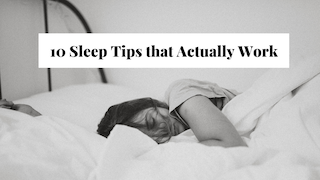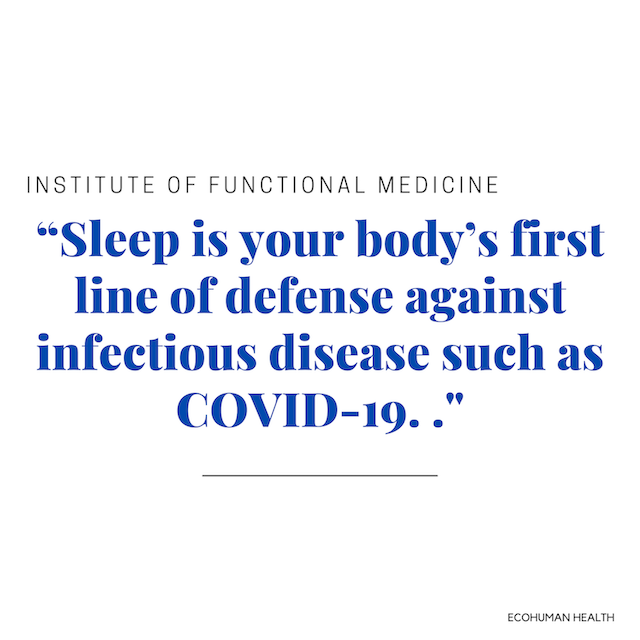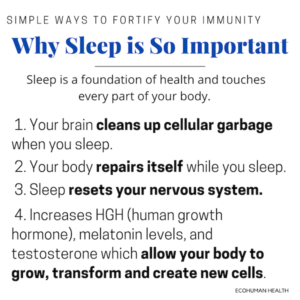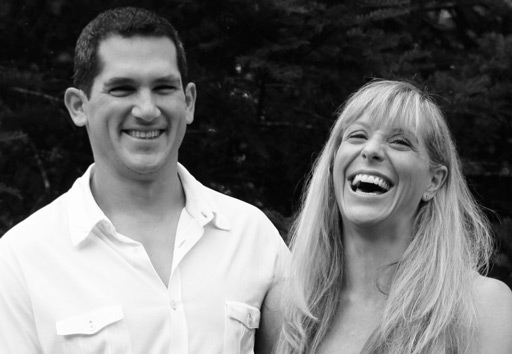Ahh…glorious sleep. Sleep is as important to our health as nutrition and exercise. Sleep is one of the pillars of health that often gets overlooked, pushed aside, or ignored. Getting good, consistent, quality sleep plays an important role in your overall health, wellness, weight loss, longevity, and in leading a happy and energetic life. As we move towards the shortest day of the year, I thought I’d share my 10 sleep tips that actually work.
I know how hard it is to make lifestyle changes due to time, resources, and an overload of information. I recommend you identify your worst sleep habit and take it out. It’s one little change you can do first. Then select one habit from my top 10 sleep tips that actually work and start doing it. Slowly but surely you’ll start to notice small changes.
What’s your worst sleep habit?
- Scrolling through social media right before trying to fall asleep?
- Checking work emails, one last time, before climbing into bed?
- Sleeping with your devices next to your head?
- Late-night snacking?
- Binge-watching a Netflix series that has you staying up to midnight?
- Drinking alcohol into the night to unwind?
- Drinking coffee throughout the afternoon to power you through?
- Eating a large meal before bed?
- Using your bedroom as a multipurpose room?
- Cranking the thermostat up and waking up to shed layers in the night?
The good news is that you can do something about not sleeping well. You can empower yourself and make small changes that will add up to good, quality, consistent sleep.
I just listened to a great webinar given by a triple-board certified physician, Dr. Zack Bush, and Dr. Pete Cummings, on the topic of sleep.
Here are my top 5 takeaways and contributing factors to 10 sleep tips that actually work:
-
Sleep debt comes with high costs.
You can be getting too little sleep or interrupted and fragmented sleep. Both have an effect on every tissue in the body and can show up as:
- Depression
- Anxiety
- Difficulty concentrating and thinking
- Having accidents
- A weakened immune system
- Low sex drive
- Poor balance
- Weight gain
- High blood pressure
- Cardiovascular disease
- Stroke
- Increased risk for diabetes
- Memory issues
What’s the correct amount of sleep for an adult?
The National Sleep Foundation recommends getting 7-9 hours per night.
2. Two important hormones are at work during your night’s sleep that play a role in controlling your metabolism:
- Human Growth Hormone
- Cortisol
Human Growth hormone – is an anti-aging hormone essential for physical growth and appropriate body mass.
Dr. Mary Pardee says “Growth hormone increases your lean body mass. It also helps you burn fat for fuel. Growth hormone improves bone mineral density and overall protects your body from aging. This is one more reason why we need to prioritize sleep to optimize our hormones.”
Cortisol – is an energizing hormone that gradually rises in the early hours of the morning to get you ready to wake. It prevents insulin from shuttling glucose into the liver and instead into your muscles, giving you a glucose kick so you can get up and going in the morning.
3. Lack of sleep increases inflammation.
Being sleep deprived elevates chemicals in the body that increase inflammation. If you’re not consistently sleeping well, your levels of C-reactive protein can be high.
Many people with neurodegenerative conditions have sleep issues due to chronic inflammation in the brain which leads to the accumulation of abnormal proteins that are associated with dementia.
1 in 2 adults have trouble going to sleep or staying asleep.
1 in 5 adults do not find their sleep refreshing.
1 in 3 adults have difficulty staying awake during waking hours.
4. You must go through all 4 stages of sleep, sequentially.
In order to wake up feeling rested and gain all the beneficial processes that good sleep brings, you need to go through all 4 stages of sleep, sequentially through the night without interruption.
What I find with many people who wake up tired and unmotivated in the morning, is that they are waking throughout the night. This means they aren’t going through all the stages of sleep, thus disrupting the quality.
Stages of Sleep
- Stage 1 – this stage occurs just as falling asleep. It’s when you disengage from the day, your mind separate from your body, and your heartbeat and breathing begins to slow. Many people experience muscle twitches and jerks during this stage as their body relaxes.
- Stage 2 – during this stage you start to transition into a deeper sleep. It is a transition phase where your heart rate continues to decrease, your muscles relax and your body temperature starts to drop.
- Stage 3 – is considered deep sleep and one of the most important phases for waking up feeling rested. It supports your body’s growth and repair as well as strengthening your immune system. In this phase, your memory consolidates, short term memory moves to long term memory, and your muscles are at their most relaxed stage.
- Stage 4: is the REM stage. REM stands for rapid eye movement – which is exactly what your eyes do during this stage. It is when your brain wave activity is similar to when you are awake and it is the phase where you dream. In this stage, your muscles are temporarily ‘paralyzed’ so you don’t act out your dreams. This phase occurs about 90 minutes after falling asleep.
Did you know…
You cycle through all 4 stages of sleep around 4-6 times a night?
Important Facts to Know for Implementing 10 Sleep Tips That Actually Work
According to Dr. Pete Cummings, a fully licensed physician, team doctor, certified coach, and life-long athlete:
- As you go through more cycles of sleep – the amount of time spent in deep sleep increases. This results in a night of more restorative and regenerating sleep and waking up feeling rested and restored.
- If you’re waking up tired despite getting approximately 8 hours a night, you’re not getting 15-20% of the deep sleep that you need. You’re most likely waking up throughout the night.
How do you know how much time you’re spending in deep sleep?
5. Track your resting heart rate.
Take it first thing in the morning before leaving bed. The lower the number the better indicator of health.
Track your sleeping heart rate by using a wearable (at Ecohuman Health we aren’t big on wearing devices when you sleep but if you’re struggling, this may be a good way to see what’s going on). By tracking your sleeping heart rate, you will see your sleep pattern. You want a steady heart rate, not one with many variations.
Dr. Pete Cummings describes some variable sleep patterns as:
- The Crash – this is when there is a sudden crash in your sleeping heart rate. It can indicate extreme exhaustion or stress.
- The Swell – this is when your sleeping heart rate follows an up and down pattern, similar to waves. This can indicate poor eating that day or prior to sleep.
- The Smiley Face – this signifies that you’ve slept well. There was a slight decrease in heart rate with a slight increase in it.
10 Sleep Tips That Actually Work
- Establish a regular bedtime and wake time.
- Shut down screens at least 1 hour prior to bed.
- Keep devices (phones, tablets, etc.,) out of the bedroom.
- Keep your bedroom dark – I mean really dark.
- Sleep with socks on.
- Switch to incandescent lighting.
- Stop drinking caffeine at 12 pm.
- Watch what you eat before bed or better yet, stop eating 2-3 hours before sleep.
- Stay hydrated.
- Leave work outside the bedroom – keep the bedroom as a sanctuary for sleep and sex.
Let’s Break Down the 10 Sleep Tips that Actually Work
Establish a regular bedtime and wake time.
Our bodies love rhythms so keeping a consistent sleep and wake time will help establish a good circadian rhythm.
How: Set a bedtime and wake time that allows you to get 7-9 hours of sleep and stick with them, even on the weekends.
Sleep with wool socks on and very little else.
Keeping your bedroom cool at night helps your core temperature drop allowing you to get into the deep sleep phase. Keeping your room cool is an easy and effective way to sleep better.
How: Open the window, turn down the thermostat, use a Chilipad, or just sleep in socks – yep, wearing socks help your core body temperature drop.
Keep your bedroom dark – I mean really dark.
We have photoreceptors in our eyes and skin. When exposed to any light, they relay a message to the hypothalamus aka master gland that it is morning. Sleeping in complete darkness promotes less nighttime wakings and deeper sleep.
How: Use blackout curtains, cover all lights on machines with black electric tape, use a digital watch as a clock, and use an eye mask.
Shut down screens at least 1 hour prior to bed.
The blue light that is emitted off your phone, TV, tablet, affects the brain by secreting excitatory neurotransmitters.
How: Set an alarm to go off 1 hour before getting into bed. Take a bath, enjoy a cup of tea, read a book, listen to music, engage in something that is relaxing.
Keep your bedroom only for sleep and sex…NO work.
Creating a safe and relaxing place for you to sleep goes a long way in promoting deep, quality sleep. Easier said than done, right? But you don’t want work-related thoughts distracting you from relaxing so keep work out of the bedroom.
How: Resist the temptation to climb into bed with your laptop. Instead, create a designated workspace outside your bedroom.
Cut off caffeine by 12 pm.
Caffeine has a half-life of about six hours; an eight-ounce cup of strong coffee contains about 300 mg of caffeine. For example: If you have a coffee at 3:00 pm, you’ll still have 150 mg of caffeine in your bloodstream at 9:00 pm. Six hours later, well into the psychogenic repair cycle (mental), you’ll still have 75 mg of caffeine stimulating your adrenal glands to produce cortisol.
How: Switch to decaf after 12 pm, enjoy a blood sugar balancing lunch to bypass the 3 pm slump, have a square of dark chocolate, and enjoy herbal teas such as Roobois, peppermint, licorice root, lemon balm, and hibiscus.
Watch what you eat before bed, or stop eating 2-3 hours prior to sleep.
Sugar, alcohol, processed foods all create a dump of glucose into your bloodstream. Doing this before going to bed inhibits your body’s ability to burn fat and be able to regenerate and recover during sleep. Instead, it will have to process it.
How: Create a meal plan and craft your dinners to include lots of plants, some protein, and healthy fats. Start a ritual of enjoying a cup of herbal tea after dinner. Peppermint, Rooibos, chamomile, fennel, ginger, lemon balm will not only help you break old habits but they will enhance your digestion.
Stay hydrated.
What you do during the day sets you up for a good sleep. Being hydrated keeps water in your tissues and helps flush out metabolic waste and aid in rebuilding and repairing tissue.
How: Drink 2-8 ounce glasses of lemon water upon waking and drink 8-8 ounce glasses of water throughout the day.
Switch to incandescent lighting.
As mentioned above, blue light emits neurotransmitters that excite you. Not exactly what you want before climbing into bed. As you start implementing your bedtime routine and having screen-free time before bed, help your body relax by creating a warm sunset hue in your home.
How: Use beeswax candles, a Himalayan lamp, switch to incandescent bulbs, sit by a fire, anything that creates a beautiful, warm sunset hue. If you need to work or use a computer, wear blue-blocking glasses. Sleep is a pillar of health and you can improve your sleep.
The light you are exposed throughout the day has a significant impact on your sleep. You can read more about your circadian rhythm and the importance of reducing blue light and increasing natural light in our article: Morning Sunlight: Ditch the Coffee and Get Energized By the Sun
There you have it, 10 sleep tips that actually work.
I do believe that this year has shown us that it’s time to step up and take responsibility for our health.
It’s not easy but there is so much that can be done with nutrition and lifestyle to make you feel better and get well.
Select 1-2 things to do and get started.
If you’re having trouble sleeping – falling asleep, staying asleep, waking at 3 am, and not feeling refreshed in the morning, I recommend you start at the top of the list and work your way down. It’s also worth it to read Morning Sunlight: Ditch the Coffee and Get Energized By the Sun and learn about your circadian rhythm.
If you need more ideas for setting yourself up for a successful night’s sleep, check out our Restorative Sleep Guide.
We offer PEMF rentals that have had resulted in improving people’s sleep.
We also have recommendations for amber-hued glasses, incandescent light bulbs, and software for your computer.
If you want to learn more about blue-blocking glasses, check our video out.
We’d love to hear how you’re managing and if there’s anything that we can do to support you?
Send us an email: connect@ecohumanhealth.com and let us know.




